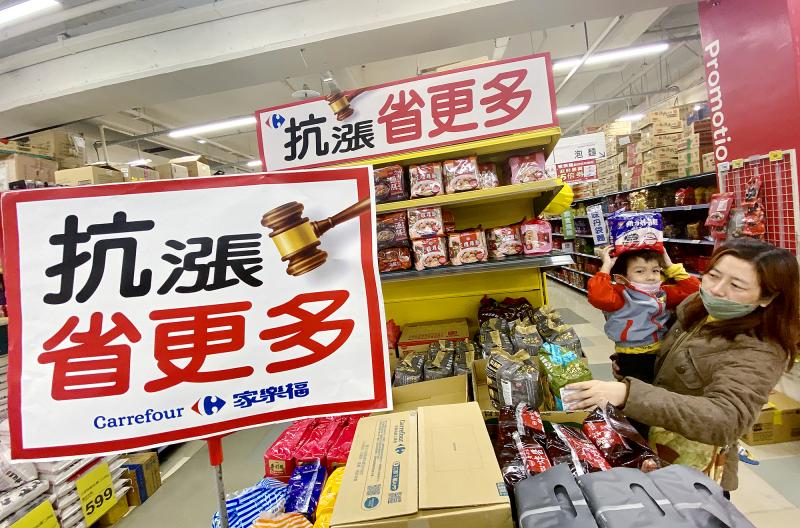Consumer prices last month rose 2.62 percent from a year earlier — the seventh time it climbed above the 2 percent alert level last year — as fuel, food and other consumption categories all became more expensive, the Directorate-General of Budget, Accounting and Statistics (DGBAS) said yesterday.
The statistics agency reiterated that inflation would taper off after the Lunar New Year, even though CPI readings for the entire second half of last year defied its predictions of a slowdown.
“The inflationary pressures are indeed building up, but could have plateaued last quarter and would ease off this year quarter on quarter,” DGBAS official Tsao Chih-hung (曹志弘) said, citing international research bodies.

Photo: CNA
Government officials have painted ongoing inflation as “transient and imported” due mainly to spikes in fuel and raw material prices, although almost all sectors — from wholesalers to retailers, restaurants, garment makers and property developers — have raised prices to reflect soaring cost burdens.
The consumer price index would stay above the 2 percent mark this quarter, but would trend down thereafter, Tsao said, mainly due to base effects.
Transportation prices climbed 5.08 percent on the back of a 19.55 percent increase in international fuel prices and a 14.08 percent upswing in domestic airfares, it said.
Food costs gained 4.23 percent, as bad weather pushed up prices for fruit by 21.61 percent and eggs by 11.75 percent, it said, adding that meat prices grew 5.49 percent and vegetable prices rose 3.36 percent.
Nelson Chang (張安平), chairman of Taiwan Cement Corp (台灣水泥) and chief executive of L’Hotel de Chine Group (雲朗觀光), yesterday said that he could not figure out why governments around the world refused to recognize inflation and reverse their loose monetary policy, the cause of stock rallies and inflation.
“I don’t like the current economic cycle where everything grows more expensive — including financial assets, real-estate properties, raw materials and labor costs, while coronavirus infections escalate,” Chang told a public function in Taipei.
In the meantime, labor and material shortages persist, because people do not want to work, he said.
Recreational and educational facilities hiked prices by 2.03 percent, while garment makers increased prices by 1.57 percent, despite lackluster business, the DGBAS said.
Living costs rose 1.55 percent due to higher prices for house repair, household items and rents, it said.
The wholesale price index (WPI), a measure of production costs, increased 12.25 percent, it said.
For the whole of last year, CPI advanced 1.96 percent, the fastest in 13 years, while WPI grew 9.42 percent, the highest in 41 years, it said, attributing the pace to unfavorable bases.

ADVANCED: Previously, Taiwanese chip companies were restricted from building overseas fabs with technology less than two generations behind domestic factories Taiwan Semiconductor Manufacturing Co (TSMC, 台積電), a major chip supplier to Nvidia Corp, would no longer be restricted from investing in next-generation 2-nanometer chip production in the US, the Ministry of Economic Affairs said yesterday. However, the ministry added that the world’s biggest contract chipmaker would not be making any reckless decisions, given the weight of its up to US$30 billion investment. To safeguard Taiwan’s chip technology advantages, the government has barred local chipmakers from making chips using more advanced technologies at their overseas factories, in China particularly. Chipmakers were previously only allowed to produce chips using less advanced technologies, specifically

BRAVE NEW WORLD: Nvidia believes that AI would fuel a new industrial revolution and would ‘do whatever we can’ to guide US AI policy, CEO Jensen Huang said Nvidia Corp cofounder and chief executive officer Jensen Huang (黃仁勳) on Tuesday said he is ready to meet US president-elect Donald Trump and offer his help to the incoming administration. “I’d be delighted to go see him and congratulate him, and do whatever we can to make this administration succeed,” Huang said in an interview with Bloomberg Television, adding that he has not been invited to visit Trump’s home base at Mar-a-Lago in Florida yet. As head of the world’s most valuable chipmaker, Huang has an opportunity to help steer the administration’s artificial intelligence (AI) policy at a moment of rapid change.

TARIFF SURGE: The strong performance could be attributed to the growing artificial intelligence device market and mass orders ahead of potential US tariffs, analysts said The combined revenue of companies listed on the Taiwan Stock Exchange and the Taipei Exchange for the whole of last year totaled NT$44.66 trillion (US$1.35 trillion), up 12.8 percent year-on-year and hit a record high, data compiled by investment consulting firm CMoney showed on Saturday. The result came after listed firms reported a 23.92 percent annual increase in combined revenue for last month at NT$4.1 trillion, the second-highest for the month of December on record, and posted a 15.63 percent rise in combined revenue for the December quarter at NT$12.25 billion, the highest quarterly figure ever, the data showed. Analysts attributed the

Taiwan Semiconductor Manufacturing Co’s (TSMC, 台積電) quarterly sales topped estimates, reinforcing investor hopes that the torrid pace of artificial intelligence (AI) hardware spending would extend into this year. The go-to chipmaker for Nvidia Corp and Apple Inc reported a 39 percent rise in December-quarter revenue to NT$868.5 billion (US$26.35 billion), based on calculations from monthly disclosures. That compared with an average estimate of NT$854.7 billion. The strong showing from Taiwan’s largest company bolsters expectations that big tech companies from Alphabet Inc to Microsoft Corp would continue to build and upgrade datacenters at a rapid clip to propel AI development. Growth accelerated for